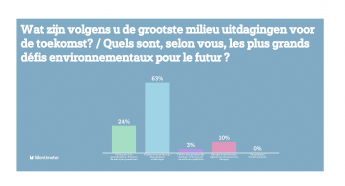Belgium is among the European leaders when it comes to recycling household packaging. Recycling is not only a fine principle. It is also indispensable. It offers a response to major challenges of the future, including climate change and the shortage of raw materials.
A child born in 2010 will still have access to fossil fuels such as oil until 2050. Valuable raw materials such as gold can still be mined at this rate until 2030 (source: TomorrowLab). During its recent webinar, Fost Plus sounded people out about the biggest environmental challenges for the future. For almost a quarter of participants (24%), this is the imminent shortage of raw materials*. Moreover, Europe has barely any primary raw materials. We depend on countries far beyond our borders, in Asia or South America.
The value of waste
As a result, industry and trade are facing huge challenges. After all, packaging is often necessary to take their products properly and safely to consumers. It protects the product during transport, safeguards it against improper use, increases its shelf life and ensures food safety, as well as providing space for the product information required by law. However, it is vitally important to minimise the impact of packaging on the environment as much as possible. We do that by recycling.
Bringing materials back into the chain and keeping them there by recycling them to make secondary raw materials that can be used in production again was said by 58% of those questioned during this webinar to be the most important characteristic of the circular economy*. A circular economy uncouples economic activity from the consumption of finite resources. It is a sustainable model that takes account of the economy, people and the environment (source: Ellen MacArthur Foundation).
This calls for a paradigm shift. We attribute value to that which was previously waste. Packaging is collected, sorted by material type and then recycled to make secondary raw materials for new products or packaging. So recycling is a lever that can help achieve the ambitious goals of the European Green Deal and stimulate the local economy by creating sustainable jobs in a futureproof sector.
A pioneering role for Fost Plus
Fost Plus aims to create this circular economy for packaging in Belgium by offering a recycling solution for all packaging items on the market. We are already well on our way: almost 95% of household packaging waste was recycled in 2020. For certain materials such as glass, paper and cardboard, metals and drink cartons, we recycle almost everything that comes on the market. For plastic packaging, we are making rapid progress and developing short chains, close to home. This way, we reduce CO2 emissions linked to transport, we create economic activity in our own country and we make high-quality recyclate available to the local production industry.
However, there are still issues: packaging that is put in the residual waste or – worse still – ends up as litter. The conclusion must therefore be that despite everything that is already being done in the fight against litter, for the moment lasting results are yet to be achieved. Broadening the Extended Producer Responsibility that shifts the financial responsibility for cleaning up litter from the communes to the companies concerned offers opportunities here. For Fost Plus, it means that by centralising litter management, recyclable packaging materials in public areas can also find their way into the recycling chain.
So focusing as much as possible on recycling and, where possible, recycled packaging, is the only way forward to cope with the challenges facing society today and to protect our planet for the future.
*During its recent webinar, Fost Plus asked participants what the circular economy means for them. The answer is clear, because 58% identified it with recycling and the reuse of materials. For almost a quarter of the respondents (22%), circularity results in new business models. Eighteen per cent said a new look at product design. The second question focused on the major environmental challenges of the future. Here, climate change was among the five possible answers for 63% of the respondents, followed by a shortage of raw materials (24%).

